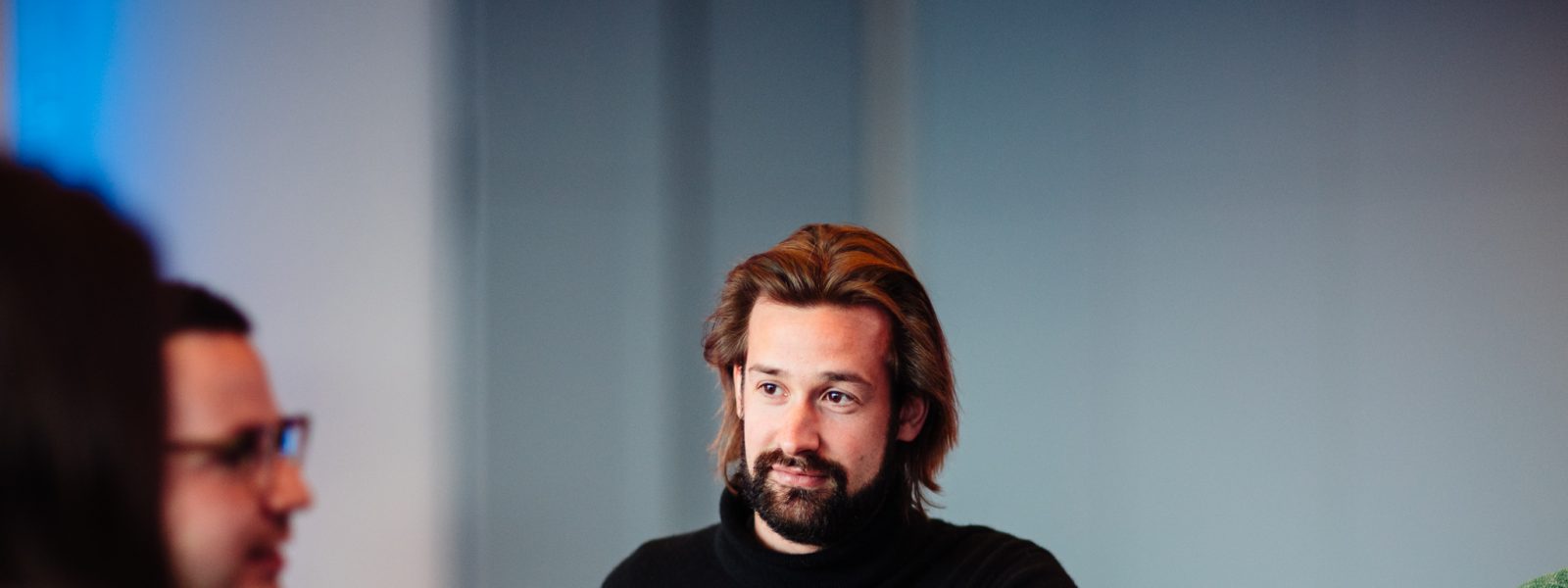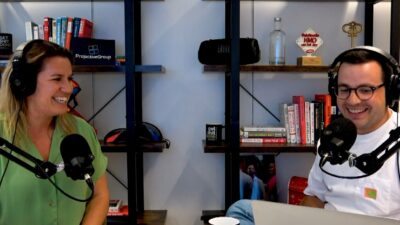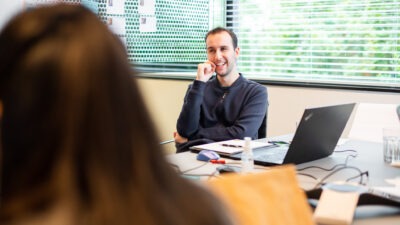Podcast: Looking for work? Here’s what (not) to do
on 26 June 2023 for GraduatesAt the mic for this episode of our podcast Exellys Talks is Lenny Sluyts (28). Lenny started at Exellys in 2020, first as a recruiter and now as a full-time account manager. He’s still got a heart for recruitment though, which is why we’ve invited him to talk about the topic “applying for jobs”. What do you need to do to get noticed by recruiters? What are some do’s and don’ts during the interview? And what comes next? Let’s find out.
Note: You can check out the full podcast episode in this 30-minute video or listen to the episode at the bottom of the page. You can find us on Spotify or YouTube as well. Please note that the podcast is recorded in Dutch and there are no subtitles. For the hearing impaired or those who don’t understand Dutch, we’ve included a written account (in English) below.
Welcome, Lenny. Before we dive into the topic, can you tell us a little bit more about yourself?
“I’m 28 years old and as you can probably tell by the way I talk, I’m from Antwerp. I’ve been with Exellys since 2020 and I’ve had an interesting journey here so far, which means I know some things about job applications, which is what we’ll be talking about today. Besides that, I used to play football, but now my hobby has become Exellys. And I like to be social and go out and do things with people as well. That’s basically me in a nutshell.”
You mentioned your interesting journey at Exellys. Can you tell us a bit more about that?
“I started at Exellys in August 2020. Initially, the plan was that I would be recruiting young professionals, people with work experience. But because certain people left the company at that point, recruiting young graduates soon became one of my responsibilities as well. Besides that I always had ambition to grow into more of an account management role, which is what I’m doing now. I started with a few clients, and now I’m doing that fulltime. I do still have a heart for recruitment though. Whenever I’m at a client’s, I’m always thinking about the candidates as well. So that’s how I’ve been growing here for the past few years.”
Your heart for recruitment is exactly what we’ll be discussing today. Let’s talk about applying for jobs. Say I’m graduating soon and looking for my first job, or I’m looking for a new challenge. What can I do to raise my profile or prepare myself for that job hunt?
“First of all – and this is something I only learnt after joining Exellys, which I wish I had known sooner – you should quite simply take a moment for reflection. Who are you as a person? What gives you energy? What are your strengths? And what costs you a lot of energy? This awareness about yourself is very valuable. I wish I had taken the time to reflect on these things after school, or even before choosing a field. Second, to apply for jobs, you obviously need a good CV.”
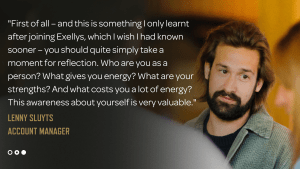
You said it’s important to learn more about who you are. Is this something that should be reflected on a resume as well? What tips can you give about what constitutes a good CV?
“What I find important in a resume is that it’s personal. When someone lays eyes on your CV, they should immediately have some idea about the kind of person you are. You don’t want to download a lay-out from a job site and end up with a resume that looks like everybody else’s. I once had an applicant in IT that chose a font for coding, that immediately gave me a good impression about the motivation of this person. That really stood out.
Something that always triggers me in a CV, is when people have a little summary text at the very top. This text basically says the same as the rest of the resume, but it feels more personal. It immediately gives you a sense of what the person behind the CV is like. In a few lines, you can say what your background is and where you want to go, what you do in your spare time.
Another thing that’s very important on a good CV, is relevant information about your education and past working experiences, if you have any. Don’t be afraid to get specific. You can mention a project, an internship, even a student job as long as it’s relevant to the position you’re applying for.
Last but not least, make sure you include your contact details on your CV. This may sound obvious, but I’ve come across several CV’s with no contact information. So even if you like the applicant, you have no way of reaching them! That of course makes it a challenge to hire them.”
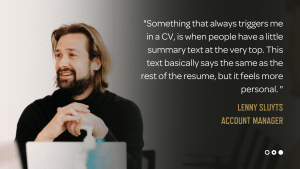
Yes, that would be tough. What about LinkedIn, is that still popular these days?
“LinkedIn is definitely still important. Not just to raise your profile, it’s also a really good way to research the company you’re interviewing for. I notice that not all students have a LinkedIn profile, and I understand that some choose not to create one because they don’t want 10 messages from recruiters every day. Nonetheless, I still think it’s important to have a LinkedIn profile when you start applying for work. Not just as a digital CV or research tool, but for the interaction aspects as well.”
You mentioned students get a lot of messages from recruiters. Especially in an IT environment, there’s a large supply of jobs and candidates are practically being stalked by companies. As an applicant, you could take on the – rather arrogant – stance of “why should I make an effort, they’re lining up for me anyways”. Why is it important for these people to be make an effort anyway?
“Well, you need to reach these companies in some way. Just by leaving your name or your number, you’re not going to trigger anyone into calling you – especially since there are probably dozens of applicants who have left a CV or a link to their LinkedIn profile at the very least. And I wouldn’t want somebody with that attitude on my team in any case.”
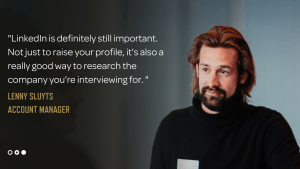
So let’s say I’ve left my CV and I’m invited for an interview. What should I do to prepare and maximise my odds of getting hired?
First of all, you should thoroughly prepare the interview by researching the company. People who come in for a job interview who know nothing about the company or the job are a big turn-off. I once had a candidate who was talking about Elexis instead of Exellys and didn’t even know we’re active in IT. You’d have to work pretty hard to come back from a first impression like that. On the other hand, I’ve had candidates who talk enthusiastically about a blog they read on our website or a vacancy they spotted there. That’s a great starting point for the rest of the interview.
Second, it’s important to be honest and authentic. Don’t be afraid to be yourself – even if you think it might give a bad impression. For example, I once had a candidate who said he loves going on vacation and preferably alone, so he doesn’t have to take anyone else into account. That’s not necessarily a bad thing. At least I could tell this person felt confident enough to be open and honest with me. You don’t have to give the socially desirable answer if it’s not your truth. Recruiters can pierce that façade rather quickly. By asking a few in-depth questions, you can spot inauthentic people from a mile away. They start giving strange answers or say things that aren’t in line with what they said before. And anyways, there’s nothing to gain from being dishonest. An interview is a dialogue between two parties, and both of those parties want the same thing out of the conversation: to know if there’s a match. If one of the parties is not putting up an honest image of themselves, that’s bound to come out sooner or later and it will have negative consequences for both of you.”
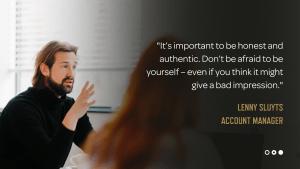
You onboarded with us in 2020, a year that a lot of things suddenly had to happen online. Do you still do online interviews now, or do you prefer face-to-face meetings?
“I think a face-to-face interview is easier. You can get a better sense of who somebody is when they’re sitting in front of you, rather than through a computer screen. But it depends on the person. I think about half the candidates prefer to come in for their interview, while the other half prefer to do it via videocall. It can be a matter of practicalities as well, maybe they already have a job and it’s not so easy to travel to our office to do it face to face.”
Do you have any tips for both types of interviews? Besides remembering to wear the bottom half of your clothes when you come in for a real-life interview, of course.
“These days, you don’t have to wear your best clothes for a job interview anymore. Just dress professionally. This means: normal clothes, but no beach wear for example. Actually, I think a lot more can go wrong during an online interview. People can look into your personal space. One time, during an application interview with a young lady, there was a laundry rack behind her which had all her underwear on display. Or technical things could go wrong as well: like only realising five minutes before the interview that it’s not on Teams but another platform, and you still have to create an account, so you’re late. I think an in-person interview is the safer option in many ways.”
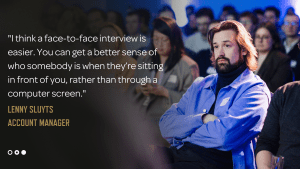
That’s some great advice, Lenny. So then after the interview, there’s often a round of feedback. Sometimes immediately after, sometimes a bit later on. How can you prepare for this?
“At the end of an interview, we always ask if there are any questions. It’s a bummer if somebody says there aren’t. Of course it’s possible that it was a great interview and all your questions have been answered, but try to prepare a few questions in advance anyways. Things like ‘what is the job about’ and ‘what does your company do’ should be clear by the end of the interview, but there’s always more you can ask. For example: which challenges is the team or the company facing right now? Where do you want to be by 2030, what are the company’s ambitions? If I’m hired, what will my onboarding look like? What is the team like? Do you do many activities after hours? Also, don’t be afraid to give feedback to the recruiter. They’re not perfect either, they can learn a lot from your feedback as well.”
Any final tips before we conclude this topic?
“Well, earlier I said it’s important to be yourself. But there are limits. For example, if people describe themselves as lazy or uninterested, that raises a lot of red flags. Don’t do that. When it comes to your appearance or what you say, I think recruiters have become a lot more relaxed. But there are minimum requirements that should be met.”
Thank you for your time, Lenny. I think we can conclude this topic for now and talk about some juicy stories at our company bar later on!
About Exellys
Exellys is a Talent Incubator. We match ambitious companies with the finest talent. Are you ready to drive the innovations of tomorrow? Ready to make an impact and become a future-fit digital leader?
Whether you are a graduate or (young) professional, Exellys will unlock your full potential by guiding you to a challenging work environment that perfectly matches your personality, expectations and ambitions.
On top of that, you are enrolled in one of our very own training and coaching programs (based on your personal and professional ambition and experience). This means that, while working as an Exellys consultant, we are helping you to bridge your ambition to excellence.
Through intensive training and coaching, you’ll gain the essential skills, competencies and knowledge necessary to become the highly effective professional you aim to be. Become an Exellyst and get in touch with us today!
Tags: exellys , job hunt , personal branding